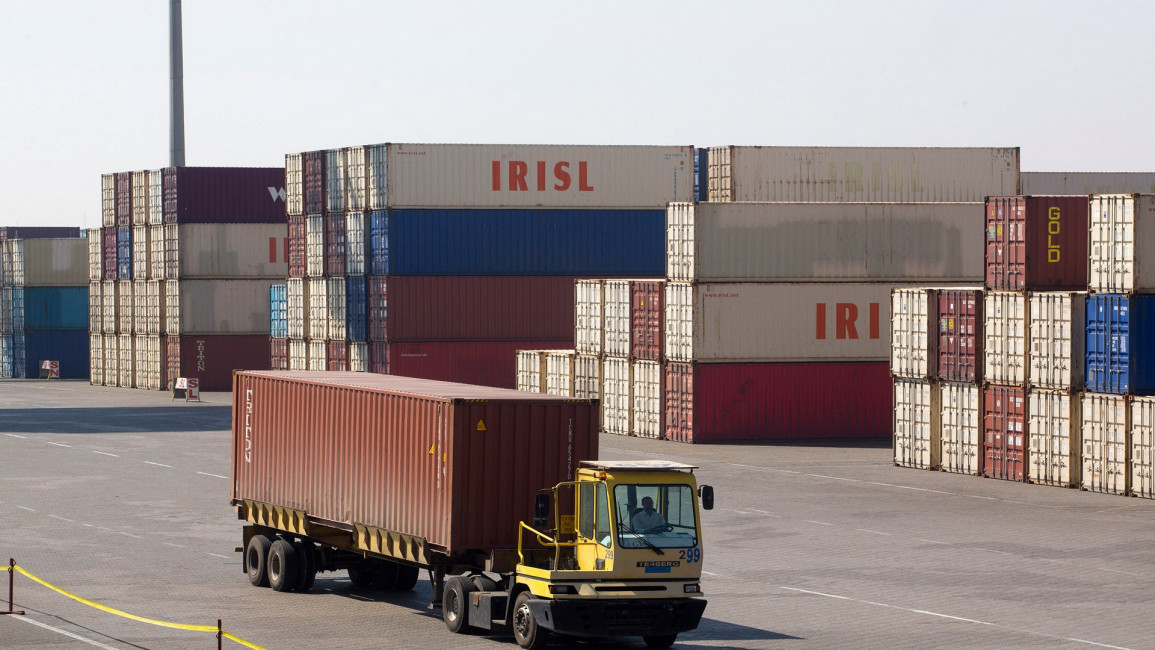Kuwait's first step in Saudi plan to isolate Iran
Kuwait's first step in Saudi plan to isolate Iran
Kuwait has banned the re-export of goods to Iran as Gulf states attempt to put pressure on Iran following the lifting of US-imposed sanctions.
2 min read
Kuwait will stop the re-export of Iranian goods to Saudi Arabia [Getty]
Kuwait has gone ahead with Riyadh's request to halt the re-export of Iranian goods and products after Saudi Arabia cut political and trade ties with Iran on January 1.
The General Administration of Customs in Kuwait made a commitment to the Director-General of Customs in Saudi Arabia that they would also sever business ties with Iran, noting that, since last week, Kuwait had blocked any Iranian products or goods from reaching Saudi Arabia through its port.
Sources in Saudi customs told The New Arab that similar steps may be applied in Oman, the UAE and Qatar.
The General Administration of Customs in Kuwait made a commitment to the Director-General of Customs in Saudi Arabia that they would also sever business ties with Iran, noting that, since last week, Kuwait had blocked any Iranian products or goods from reaching Saudi Arabia through its port.
Sources in Saudi customs told The New Arab that similar steps may be applied in Oman, the UAE and Qatar.
Trade between Saudi Arabia and Iran hit a record $700 million in 2008, before it collapsed to $200 million after the UN Security Council imposed strict economic sanctions on Tehran.
The chairman of the National Advisory Committee offices in Saudi Arabia, Assem Arab, said that the Saudi move came as part of wider efforts to put more pressure on the Iranian economy.
Arab told The New Arab that he expected "other Gulf countries to take a similar position, and this will increase the pressure on Iran".
"Iran will not feel the benefits of the release of their previously frozen funds in the West immediately," he said, referring to the ending of sanctions following the nuclear deal last year.
"There are many conditions to meet first, and this will add to the country's financial crisis.
"Saudi Arabia’s move should not be individual; other Gulf countries should agree to this, particularly the UAE, Qatar and Bahrain. It is also not unlikely that Oman might join them. This will force Iran to recalculate its policies in the region," he said.
The chairman of the National Advisory Committee offices in Saudi Arabia, Assem Arab, said that the Saudi move came as part of wider efforts to put more pressure on the Iranian economy.
Arab told The New Arab that he expected "other Gulf countries to take a similar position, and this will increase the pressure on Iran".
"Iran will not feel the benefits of the release of their previously frozen funds in the West immediately," he said, referring to the ending of sanctions following the nuclear deal last year.
"There are many conditions to meet first, and this will add to the country's financial crisis.
"Saudi Arabia’s move should not be individual; other Gulf countries should agree to this, particularly the UAE, Qatar and Bahrain. It is also not unlikely that Oman might join them. This will force Iran to recalculate its policies in the region," he said.
Economist Khaled Johar said that Iran focuses its export of commodities on third parties.
"There are no direct payment methods between Saudi Arabia and Iran, as Iran does not have letters of credit, and there are no direct shipping flights," he said.
"Saudi Arabia's economy will not be affected by the boycott of Iranian commodities, and likewise for Iran, because trade exchange between the two countries is already limited," he added, though he felt that the boycott would mark an "important stance" and diplomatic escalation.
"Commercial ties with other Gulf countries will likely harm Iran, as it would lose investments that targeted them in the region."



